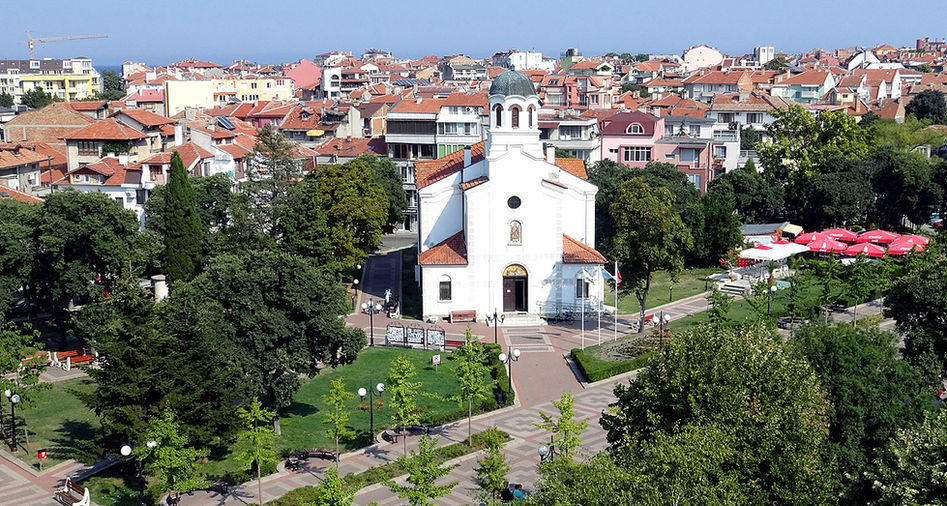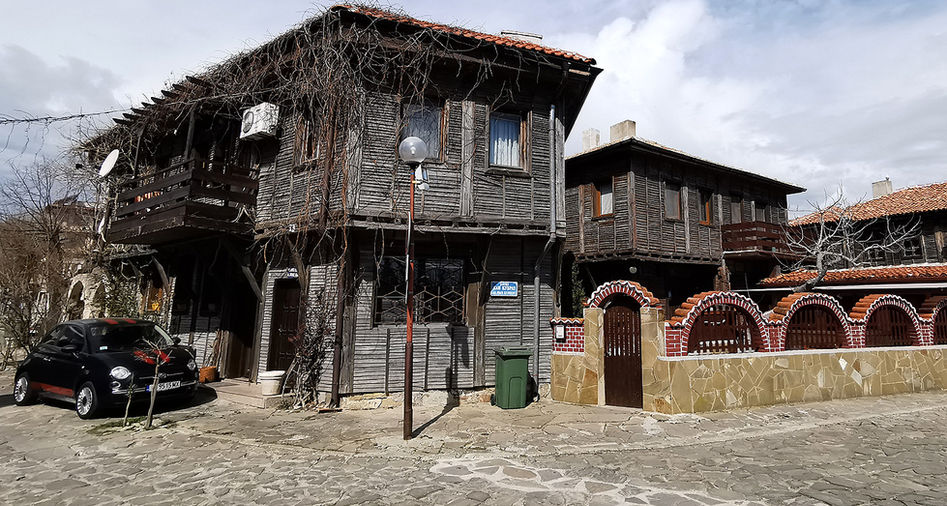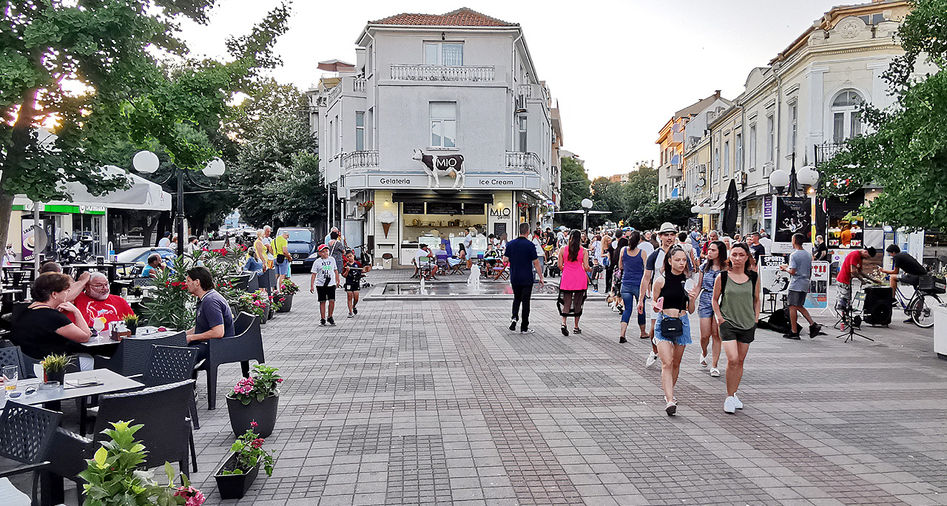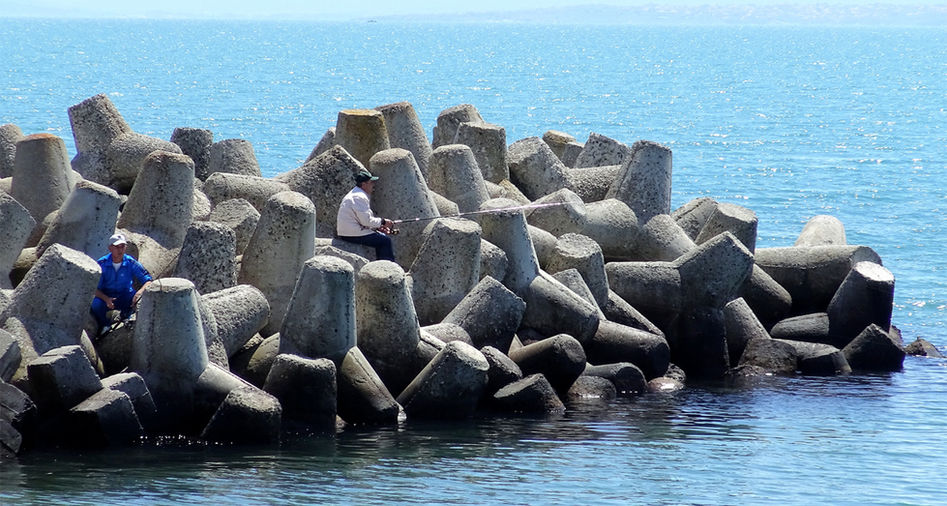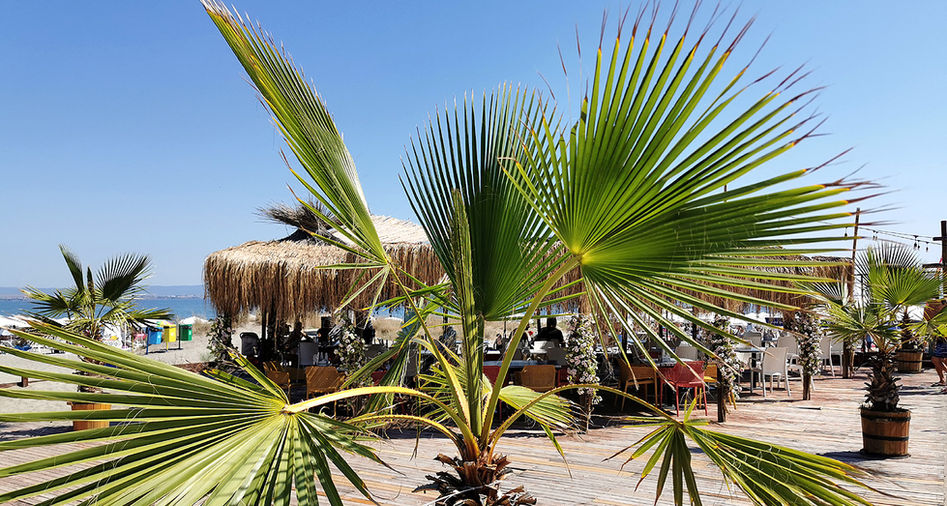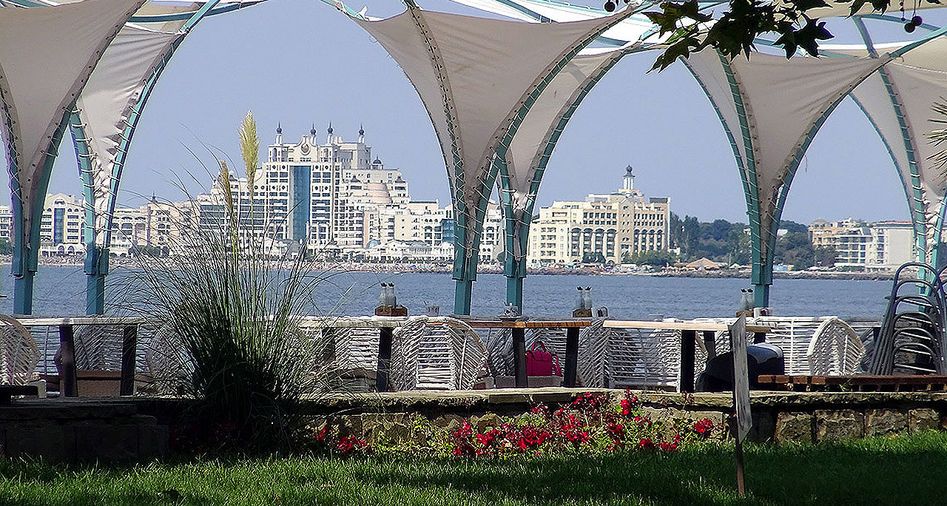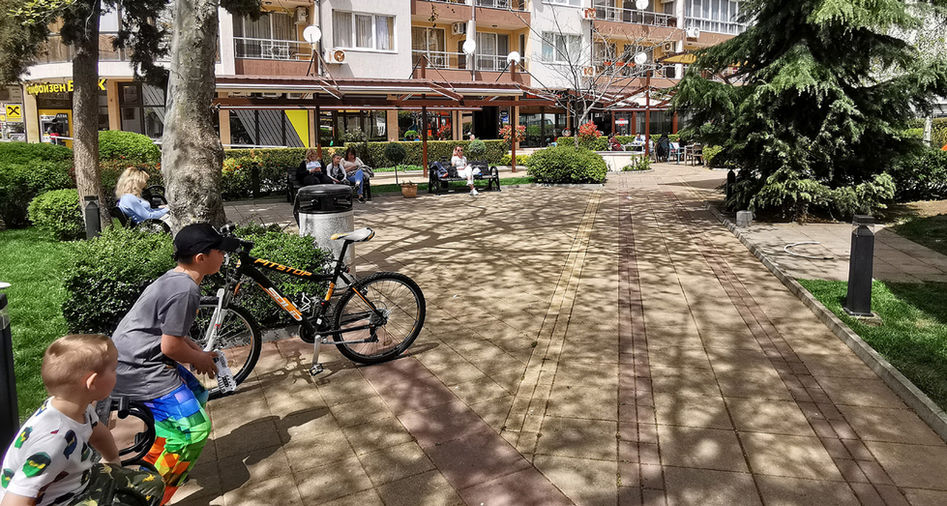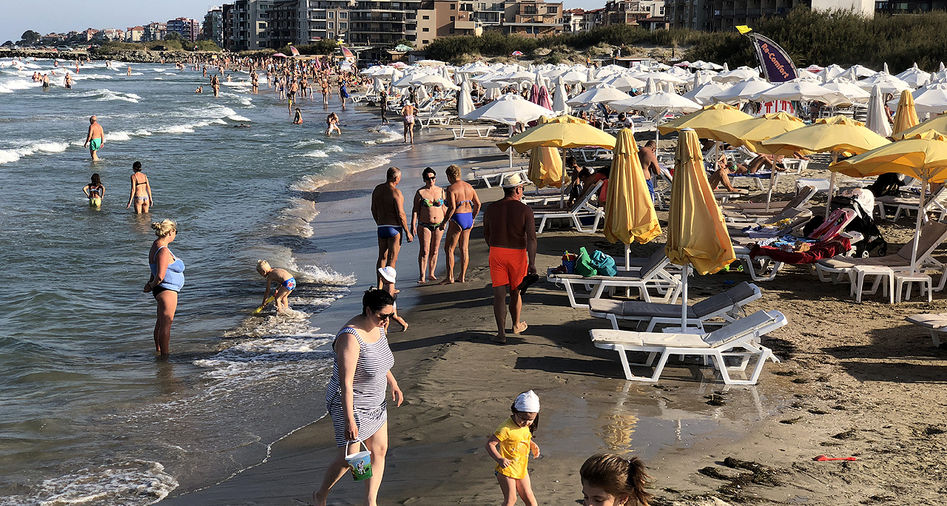A town by the sea named Pomorie
If you look at the city from a bird's eye view, where the Shine Residence elite class residential complex is being built, you will probably think that Pomorie is located on a small island, surrounded on all sides by water. In fact, this is a peninsula that connects to the mainland by a narrow isthmus, sometimes flooded by the sea.

The population of the city is 14 thousand people. The location is extremely convenient. The fourth largest Bulgarian city of Burgas is only 18 kilometers away. To the international Burgas airport and even less - 10 kilometers. To the city-museum Nessebar - 21 km, to Varna - 114.
In a word, Pomorie is an ideal place for those who love the leisurely life of small and cozy towns. but at the same time, he can always get out to the metropolis in the neighborhood to go shopping, see a new production of an opera or ballet in the theater, visit an art exhibition, etc. At the same time, there are so many interesting, useful and even exclusive things in Pomorie itself that it is worth at least briefly talking about it
twenty five centuries of history
It is generally accepted that the first city on the site of today's Pomorie was founded by Greek colonists as early as the 6th century BC. That is, earlier than most European capitals. He was given the name Anchialo, which in Greek means "close to the sea." Over the past two and a half millennia, Pomorie has been part of many kingdoms, empires and states. In 450 B.C. e. he was captured by the Thracians, then fell under the rule of Macedonia. Next was Roman rule. In the Roman era, the city even minted coins - from the reign of Emperor Domitian to Emperor Gordian I. Following the Roman era, a thousand-year Byzantine history began, which was interrupted by raids and destruction of the Goths Slavs, Avars, Bulgarians.




These coins were minted two thousand years ago in Anchialo, when the city was part of the Roman Empire.
However, we will not delve too deeply into the history of Pomorie, so as not to deprive you of the pleasure of studying it on your own. If you settle here, then for sure you will be carried away by this cognitive activity. In the Pomorie Historical Museum you will find many interesting exhibits. For example, a rich numismatic collection of coins of Anchialo of the Roman era, as well as the neighboring cities of Messambria, Deult, Marcianopol. You will feel sincere admiration for the craftsmanship of ancient builders by visiting the domed tomb-mausoleum on the outskirts of Pomorie, which combines Roman construction methods with Thracian traditions. Many more interesting historical discoveries await you in this city.

Who and where lives in Pomorie
Despite its external compactness and relatively small population, modern Pomorie consists of several historical parts. The heart of Pomorie is the Old Town, which is sometimes also called the Greek Quarter. Once upon a time, Greeks actually lived in this quarter. But as a result of the Balkan wars of the early twentieth century, many Greeks were forced to move to their historical homeland, as well as the Bulgarians from Greece - to their home.
In the Greek quarter, the interweaving of streets and lanes is somewhat reminiscent of a labyrinth. No matter how much you wander through them, you will always find something new in the area. Bulgarian houses of the 19th century, typical of the Black Sea coast, have been preserved here.
The landmark of the quarter is the architectural reserve "Old Houses of Pomorie" and the Orthodox Church of the Transfiguration of Christ, built and consecrated back in 1765. There are many family-type hotels, cafes and restaurants, various shops and shops. From the Greek quarter originates Pomorie "pedestrian", with its lively evening life. And the entire area is framed by a seafront promenade with sandy beaches, marinas and fishermen's boats, hotels, restaurants.
The second significant part of Pomorie is the New Town. This area also arose due to the Balkan wars of the early twentieth century. In those years, many Bulgarians fled from Greece and they had to settle somewhere. The Orthodox monastery of St. George, located in the area, helped to get land for the construction of housing for refugees. Since the area adjoins the shore of the Burgas Bay, beaches, new residential complexes, and a modern water park appeared here. And connects the Old and New Towns in Pomorie by a sea promenade with a length of more than two kilometers.
And in Pomorie there is a modern area, which the Bulgarians call the Russian Quarter. Russians, or rather Russian-speakers from around the world, really have a direct bearing on its emergence. Thanks to their investments in real estate, modern high-rise buildings have grown here, shops, cafes, and restaurants have appeared. Russian speech sounds everywhere, residential complexes are called pleasant for the Russian ear by the names "Little Russia", "Aivazovsky Park".
True, in recent years, when due to the coronavirus pandemic and the Ukrainian military conflict, it became more difficult for property owners from Russia to come here, they began to sell their apartments to both Bulgarians and Russians from European countries. Pomorie housing is large, liquidity is high. After all, next to the Russian Quarter there are the best sandy beaches, which are periodically marked with the international Blue Flag for high quality standards and suitability for safe swimming.
The residential complex Shine Residence is located in the very center of the Russian Quarter.
And, finally, we should mention one more, in its own way, exotic region of Pomorie. This is a gypsy community. It is located on the shore of Pomorie Lake, at the very exit from the city. Gypsies live in isolation, you rarely meet them in the New and Old City, except perhaps working on sweeping the streets or taking out the garbage. Fortune-telling and pickpocketing, as is the case in some cities, local gypsies do not trade. But in the summer, when Pomorie is flooded with vacationers, gypsies appear in the city on picturesque cabs pulled by sleek horses. And they conduct romantic trips around the city for those who wish.

Sun, air and water
Outside of Bulgaria, Pomorie is widely known as the country's sunniest resort town. In summer, the weather is always hot here, the air temperature reaches +33 degrees, sea water - up to +26-28. At the same time, the heat in Pomorie is much easier to endure than in other Black Sea resorts. The reason for this is simple: the city is surrounded on all sides by water and no matter where the sea breeze blows from, it blows through Pomorie like a stream of natural air conditioner, creating a comfortable climatic environment.

The beaches here are sandy, stone breakwaters reliably protect bathers from the violence of the elements. Entry into the water is safe as the descent is gentle. What is especially important as for non-swimmers and for small children. In addition to the city beaches protected by lifeguards, tourists and locals especially like to relax on a long sandy spit that separates the healing Pomorie lake from the sea.

On the Pomorie spit, the water is especially clear, there is no beach crowd, the sand is almost black due to large impurities of iron and has healing properties. On the spit, it quickly heats up from the sun and makes the beach even warmer.
As for the sun, Pomorie is hardly the only city in Bulgaria, whose inhabitants can both meet the dawn on the sea and see off the heavenly body in the evening on the sea embankment beyond the horizon. Everything is very simple: the sun rises on the east coast, sets on the west coast. Sunrises and sunsets here are so beautiful that many people come to Pomorie from other cities for the July morning holiday.

This holiday arose spontaneously, no one invented it and does not organize it. This is a purely Bulgarian tradition, in other countries it is not known and not carried out. The essence of the holiday is to joyfully meet the sunrise on July 1 in the company of friends. The anthem "July morning" is the hit of the same name by the cult group Uriah Heep. Youth have fun on the beach all night in anticipation of dawn. Older people pull up to the beaches and piers in the early morning. The apotheosis of the holiday is the sunrise from behind the sea horizon. And, of course, not without a morning swim. Moreover, at 6 am the water temperature is higher than the air temperature.
Health in Pomorie!
Since ancient times, the waters and mud of the Salt Lake, which washes Pomorie, were considered beneficial, healing wounds and rheumatism. The Thracians even had their own sanctuary here. Roman legionnaires healed battle wounds with therapeutic mud. Nowadays, the Pomorie Resort is considered one of the largest and most famous balneological centers in Bulgaria, and in Europe as a whole, where many ailments are cured using local mud.

The five-star Grand Hotel Pomorie has one of the best balneological and SPA centers in the resort.
The first mud bath was built here in 1902. Now in Pomorie there are many balneological centers and sanatoriums that work all year round, offering a range of medical and healing procedures. Cardiovascular, nervous, skin, gynecological diseases are treated here. Mud and meadows help restore the liver and musculoskeletal system. Among the diagnoses in which Pomorie procedures can help are cerebral palsy, sciatica, rheumatism, sciatica, lumbago, hernia, etc.

The mud that is mined at the bottom of the salt lake has strong healing properties. Experts consider them to be among the most effective not only in Bulgaria, but also in Europe. Moreover, visiting tourists take this mud not only in balneological centers, but also right on the shore of the Salt Lake.

By the way, many people of the older generation remember that in Soviet times, Pomorin was perhaps the most popular toothpaste in the USSR. So, it was made in Bulgaria exclusively on the basis of salts and minerals from Lake Pomorie. Nowadays, the production of this pasta has been restored, it can be purchased in Pomorie.

In addition, now, under the auspices of the Bulgarian Academy of Sciences, an extensive line of useful and medicinal products is being produced based on natural components found in the waters of the Pomorie Salt Lake. They are sold in Pomorie in cosmetics stores and pharmacies, taking advantage of the increased demand of residents and visitors.
Russian quarter everyday life
In most Bulgarian resort towns where Russians have bought beach property, life comes to a standstill with the end of the summer season. Owners of studios and apartments, having locked their homes, disperse and scatter until next summer to their places of permanent residence. And those who remain are preparing for a hermit existence, stocking up on food, insulation devices and electric sheets. Lonely life in a deserted city where everything is closed is boring and monotonous.
Pomorie, unlike purely resort towns, is a happy exception. Active life is in full swing here all year round. Kindergartens and schools, shops and supermarkets of large retail chains, notary offices, restaurants, sports facilities work. Medical centers and pharmacies serve customers constantly.

A summer resort, when the number of residents in Pomorie increases many times due to vacationers, it is only a few months a year. The rest of the time it is an ordinary city in which people lead an ordinary daily life. Due to this circumstance, many Russians chose Pomorie for permanent or long-term residence. Especially those who have children in their families.

Interestingly, Russian-speaking children easily adapt to Bulgarian schools and after a few months of study, they begin to speak Bulgarian easily. They have something to do after school - there are hobby groups, sports clubs, sections. Adults in Pomorie are also not bored, there are many cultural events, concerts, vernissages in the city gallery. Of course, there are especially many entertainments in the summer - various festivals, concerts, folklore holidays, etc.

At the same time, many residents of Pomorie like spring and autumn even more than hot summer. Spring is early here, everything blooms a month and a half earlier than in central Russia or, say, in the Baltic states.

A riot of colors, fields strewn with bright poppies, juicy green grass on the lawns, which by the middle of summer will become withered from the sun's rays. Autumn is just as pleasant - long and warm. It lasts one and a half to two months. At this time, many people like to travel to the exotic corners of Bulgaria and neighboring countries. Fortunately, Greece, Turkey, Romania, Macedonia are very close, and travel packages at this time are falling in price.
But after returning from a trip, most travelers say: “It's good that we are at home. It's good that we live in Pomorie!”


